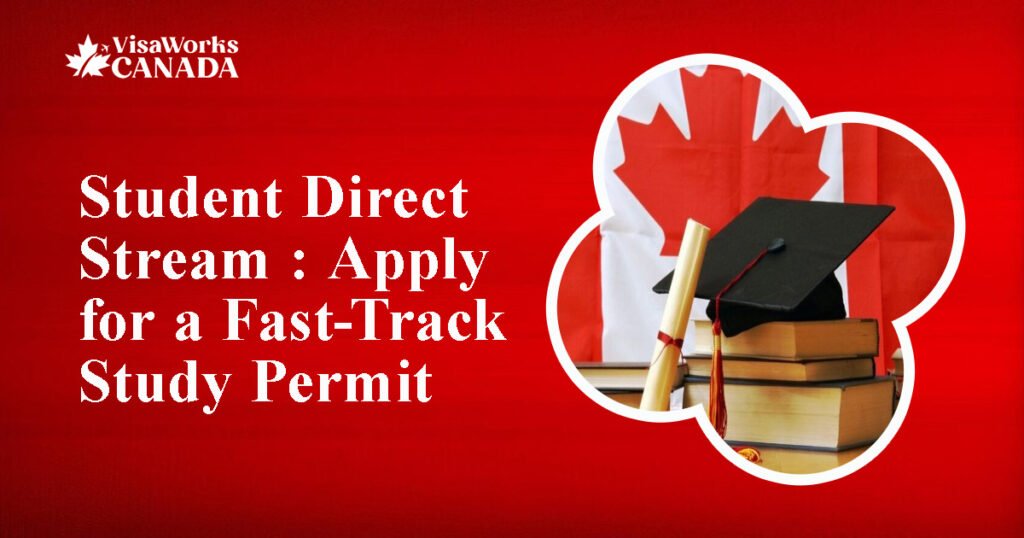The Student Direct Stream (SDS) is a streamlined visa process for international students aspiring to study in Canada. This program aims to simplify and expedite the application process, making it easier for eligible students from select countries to secure their study permits swiftly.
SDS offers significant advantages for international students, reducing the time and complexity involved in obtaining a study permit. It has been designed to attract more students to Canada, enriching the country’s educational environment and fostering cultural exchange.
Eligibility Criteria
To qualify for the Student Direct Stream, applicants must meet specific criteria. These requirements ensure that only qualified students benefit from the expedited process.
Firstly, SDS is available only to students from designated countries. Additionally, applicants must meet academic and language proficiency standards, demonstrate financial sufficiency, and provide all necessary documentation to establish their eligibility.
Participating Countries
The Student Direct Stream is open to students from a specific list of countries. These include China, India, the Philippines, and Vietnam, among others. Each country may have its own specific requirements that applicants must fulfill.
Recent updates have expanded the list of participating countries, offering more students the opportunity to apply through SDS. It’s crucial to check the latest information to see if your country is included and to understand the specific requirements that apply.
Required Documents
Applicants for the Student Direct Stream need to gather several essential documents. These documents serve as proof of eligibility and help ensure a smooth application process.
If you meet the SDS visa application criteria, you will need to provide the following documents:
- Acceptance letter from a Designated Learning Institution (DLI).
- Proof of tuition payment for the first year of study.
- Evidence of payment for a Guaranteed Investment Certificate (GIC) from a participating Canadian financial institution.
- Language proficiency test results (IELTS, TEF, or TRF).
- A copy of your medical examination from an authorized panel physician.
- Relevant academic background documents, including all educational certificates.
- Certificate of Acceptance of Quebec (CAQ) if you plan to study in Quebec.
Language Scores Accepted for SDS Visa Application
As of August 10, 2023, IRCC has started accepting additional English language tests for the SDS visa program. The IELTS test remains a recognized option, and the required band score of 6 has not changed.
Applicants taking the IELTS Academic must achieve a minimum overall band score of 6.0. For the IELTS General Training exam, a minimum band score of 6.0 in each skill (listening, reading, writing, and speaking) is required.
The IRCC’s overall SDS permit score requirements for academic tests are as follows:
- IELTS Academic – 6.0
- CAEL – 60
- TOEFL iBT – 83
- PTE – 60
Preparing thoroughly for these tests is essential, and numerous resources are available to help you achieve the required scores. Meeting these language requirements demonstrates your readiness to thrive in a Canadian academic environment.
Financial Requirements
Proving financial stability is a key part of the SDS application. You must show that you have the necessary funds to support your studies and living expenses in Canada.
A critical financial document is the Guaranteed Investment Certificate (GIC), which confirms you have sufficient funds for your first year in Canada. Additional financial documents may include bank statements, scholarship letters, or a sponsor’s letter of financial support.
Designated Learning Institutions (DLIs)
A Designated Learning Institution (DLI) is a school approved by a provincial or territorial government to host international students. Only students enrolled in DLIs are eligible for a study permit under SDS.
Finding a recognized DLI is crucial. The Canadian government’s official list of approved schools is a helpful resource. Choosing the right DLI ensures you meet the study permit requirements and sets you on the path to a successful academic career in Canada.
Difference Between Student Direct Stream and Regular Stream
The Student Direct Stream and the Regular Stream are two pathways to obtaining a study permit in Canada, each with distinct processing times and requirements.
The SDS offers faster processing for students from specific countries who meet stringent criteria, including higher language proficiency and financial stability. In contrast, the Regular Stream is available to students from all countries and generally involves longer processing times due to broader eligibility criteria and a more comprehensive review process.
Understanding these differences can help you choose the most suitable option for your situation, ensuring a smoother application experience.
Application Process
Applying for the Student Direct Stream involves several key steps. First, gather all required documents, such as your acceptance letter, proof of financial support, and a valid passport. Next, submit your application online or via paper, depending on your preference and location.
Understanding the differences between online and paper applications can help streamline the process and avoid delays. Additionally, being aware of application fees and typical processing times helps you plan effectively.
Biometrics Requirement
Biometrics, which include fingerprints and a photo, are required for most SDS applicants. This step helps the Canadian government verify your identity and ensure the security of the visa process.
You will need to provide biometrics at a designated collection point. There is a fee for this service, which must be paid when you submit your application. Including biometrics early in your application process can prevent delays.
Upfront Medical Examination
Depending on your home country, you may need to undergo a medical examination as part of your study permit application. This examination ensures that you meet Canada’s health standards and do not pose a public health risk.
Scheduling your medical examination with an approved panel physician is crucial. This step must be completed before submitting your application. Understanding what to expect during the examination helps you prepare adequately.
Visa Processing and Approval
Visa processing under the Student Direct Stream is designed to be efficient. Typical processing times vary, but the SDS aims to issue study permits more quickly than the regular process.
Once your application is processed, you will receive a decision. If approved, you will receive your study permit and can begin planning your move to Canada. If there are any delays, understanding the reasons can help you address any issues promptly.
Post-Approval Steps
After receiving your study permit, there are several important steps to take. Preparing for your move to Canada involves gathering necessary documents, arranging accommodation, and planning your travel.
When you arrive in Canada, you will go through immigration procedures at the border. Being prepared and knowing what to expect ensures a smooth entry into the country.
Studying in Canada
Studying in Canada offers a wealth of opportunities. The country is known for its high-quality education and welcoming environment. Adjusting to student life in Canada involves understanding academic expectations, workload, and cultural differences.
There are numerous resources and support services available for international students. These services can help you navigate challenges and make the most of your educational experience.
Working While Studying
International students in Canada have the opportunity to work while studying. On-campus employment is readily available and allows you to gain work experience without a separate work permit.
Off-campus employment is also an option for full-time students enrolled at a DLI. You can work up to 20 hours per week during academic sessions and full-time during scheduled breaks. Co-op and internship programs provide additional opportunities to gain relevant work experience.
Bringing Family Members (Master’s Degree Applicants)
If you are completing a master’s degree, your spouse or common-law partner may be eligible for an open work permit. This permit allows them to work for any employer in Canada, providing financial stability and enriching your family’s experience.
Dependent children can also accompany you and may need a study permit to attend school in Canada. Understanding the conditions and restrictions for bringing family members helps you plan effectively.
Extending Your Study Permit
If you need more time to complete your studies, you can apply for an extension of your study permit. It’s important to apply for an extension before your current permit expires to maintain your status in Canada.
Required documents for an extension include proof of enrollment, academic transcripts, and proof of financial support. Avoiding common reasons for extension denial, such as incomplete applications or lack of funds, increases your chances of a successful extension.
Post-Graduation Work Permit (PGWP)
The Post-Graduation Work Permit (PGWP) allows you to gain valuable work experience in Canada after completing your studies. To be eligible, you must have graduated from a DLI and meet specific criteria set by IRCC.
The application process for a PGWP involves submitting proof of graduation, a valid study permit, and meeting language requirements. The duration of the PGWP is typically the same as the length of your study program, up to a maximum of three years.
Pathways to Permanent Residency
Canada offers several pathways to permanent residency for international students. The Express Entry system is a popular option, allowing skilled workers to apply for permanent residency based on their qualifications and work experience.
The Provincial Nominee Program (PNP) provides opportunities for students to be nominated by a province or territory based on their skills and job prospects. Understanding these pathways helps you plan for a long-term future in Canada.
Study Permit Refusals and Appeals
Study permit refusals can happen for various reasons, including incomplete applications, insufficient funds, or failure to meet eligibility criteria. Understanding these reasons helps you avoid common pitfalls.
If your application is refused, you can appeal the decision or reapply with additional supporting documents. Addressing the reasons for refusal and providing thorough documentation can improve your chances of a successful reapplication.
Important Tips for a Successful Application
Avoid common mistakes such as incomplete forms, missing documents, and incorrect information. Ensuring your application is thorough and accurate increases your chances of approval.
Utilize resources and support services, such as immigration consultants or legal advisors, to guide you through the application process. From expert visa services to comprehensive guidance on permanent residency, study visas, and business ventures in Canada, VisaWorks Canada Ltd. is here to help you navigate every step of your journey.
Living in Canada as an International Student
Living in Canada offers a high quality of life and a diverse cultural experience. Understanding the cost of living and budgeting effectively is crucial for managing your finances.
Accommodation options vary, including on-campus housing, private rentals, and homestays. Each option has its benefits and considerations. Additionally, adjusting to a new culture and utilizing student support services can enhance your experience.
Frequently Asked Questions (FAQs)
Which countries are eligible for SDS? Countries eligible for SDS include China, India, the Philippines, Vietnam, and others. Check the latest updates for the complete list.
What documents are required for SDS? Required documents include a valid passport, an acceptance letter from a DLI, proof of tuition payment, a Guaranteed Investment Certificate (GIC), language test results, educational transcripts, and proof of an upfront medical examination.
Can I work while studying under SDS? Yes, international students can work on-campus and off-campus under certain conditions without needing a separate work permit.
How long does it take to process an SDS application? Processing times vary, but the SDS aims to issue study permits more quickly than the regular process.
What if my study permit application is refused? If your application is refused, you can appeal the decision or reapply with additional supporting documents addressing the reasons for refusal.
What are the options for international students after graduation? International students graduating from Canadian institutions may be eligible for a Post-Graduation Work Permit (PGWP), allowing them to gain valuable work experience in Canada. They may also explore pathways to permanent residency through programs like Express Entry or Provincial Nominee Programs.
How can VisaWorks Canada Ltd. assist international students? From expert visa services to comprehensive guidance on permanent residency, study visas, and business ventures in Canada, we’re here to help you navigate every step of your journey. Contact us now for personalized assistance.
Conclusion
The Student Direct Stream is an essential pathway for international students seeking to study in Canada. Understanding the requirements, process, and opportunities available can make your transition to studying in Canada smooth and successful.









